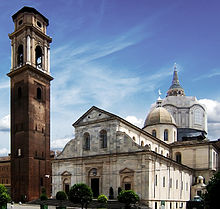Roman Catholic Archdiocese of Turin
|
Archdiocese of Turin Archidioecesis Taurinensis Arcidiocesi di Torino |
|
|---|---|

|
|
| Location | |
| Country | Italy |
| Statistics | |
| Area | 3,350 km2 (1,290 sq mi) |
| Population - Total - Catholics |
(as of 2010) 2,115,000 2,020,313 (95.5%) |
| Information | |
| Rite | Roman Rite |
| Established | 4th Century |
| Cathedral | Metropolitan Cathedral of Saint John the Baptist (Cattedrale Metropolitana di S. Giovanni Battista) |
| Current leadership | |
| Pope | Francis |
| Metropolitan Archbishop | Cesare Nosiglia |
| Auxiliary Bishops | Guido Fiandino |
| Emeritus Bishops | Severino Poletto |
| Map | |
 |
|
| Website | |
| www.diocesi.torino.it | |
The Roman Catholic Metropolitan Archdiocese of Turin (Latin: Archidioecesis Taurinensis) is an ecclesiastical territory or diocese of the Roman Catholic Church in Italy. Founded in the 4th century and elevated to the dignity of an archdiocese on 21 May 1515, by Pope Leo X. Its mother church is the Cathedral of Saint John the Baptist. Since 2010 the Archbishop of Turin has been Cesare Nosiglia.
The first bishop of Turin whose name has survived was St Maximus. He can hardly be considered the first bishop of Turin, even though no other bishop is known before him. Maximus, many of whose homilies are extant, died between 408 and 423.
It was another Maximus who lived in 451 and 465. In 494 Victor of Turin went with St Epiphanius to France for the ransom of prisoners of war. St Ursicinus (569-609) suffered at the hands of the Franks. It was then that the Diocese of Moriana (Maurienne) was detached from that of Turin.
Other bishops were Rusticus (d. 691);Claudius of Turin (817-27), a copious and controversial writer, famous for his opposition to the veneration of images; Regimirus (of uncertain date, in the 9th century), who established a rule of common life among his canons; Amolone (880-98), who incurred the ill-will of the Turinese and was driven out by them; Gezo (1000), who founded the monastery of San Solutore in Turin; Landulf (1037), who founded the Abbey of Cavour and repaired the damage inflicted on his Church by the Saracen incursions; Cunibert of Turin (1046–1080), to whom St Peter Damian wrote a letter exhorting him to repress the laxity of his clergy; Boso (1122–c.1127), who resigned as a cardinal to become bishop; Uguccione (1231–43), who abdicated the bishopric and became a Cistercian; Guido Canale enlarged the cathedral.
...
Wikipedia
